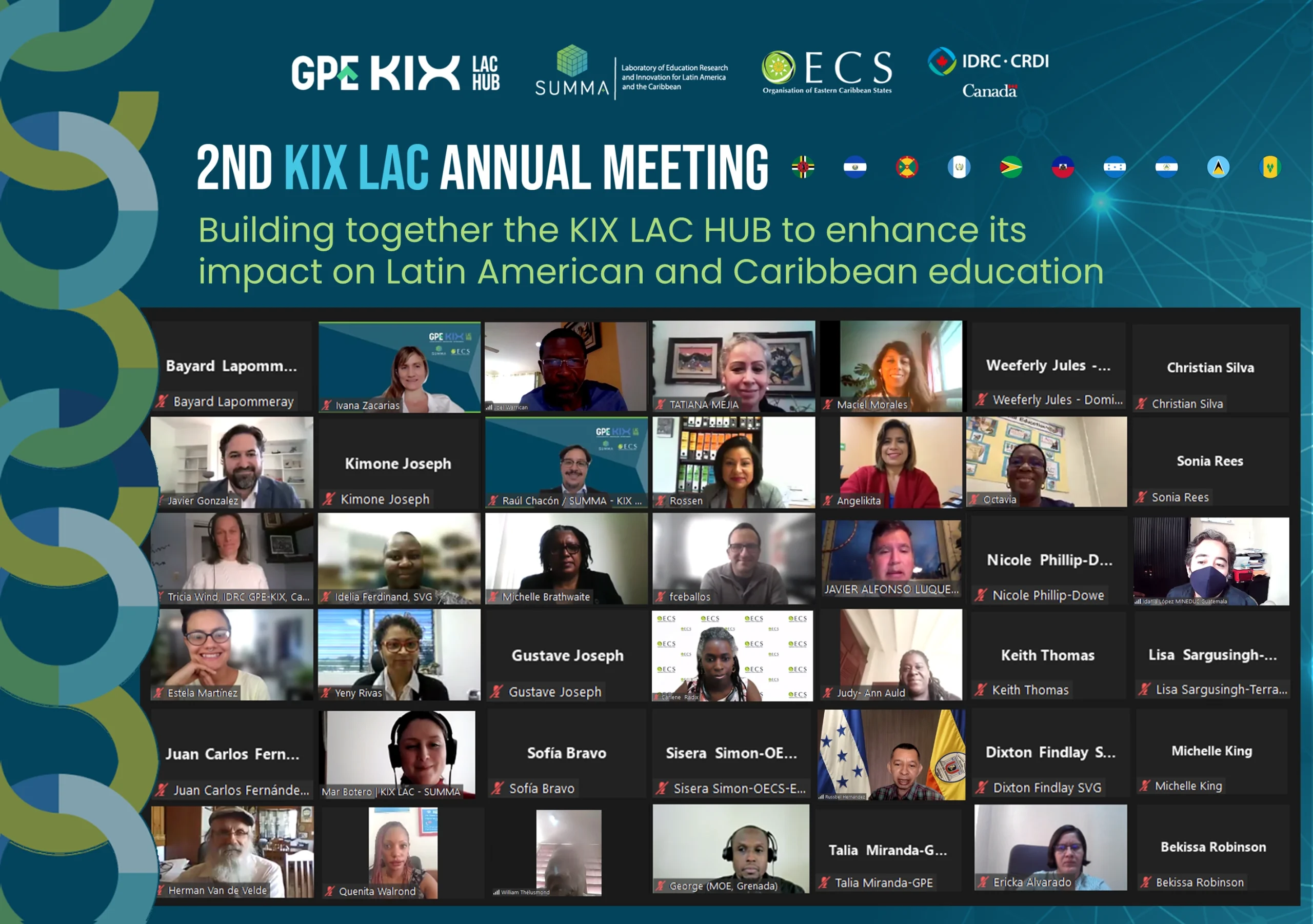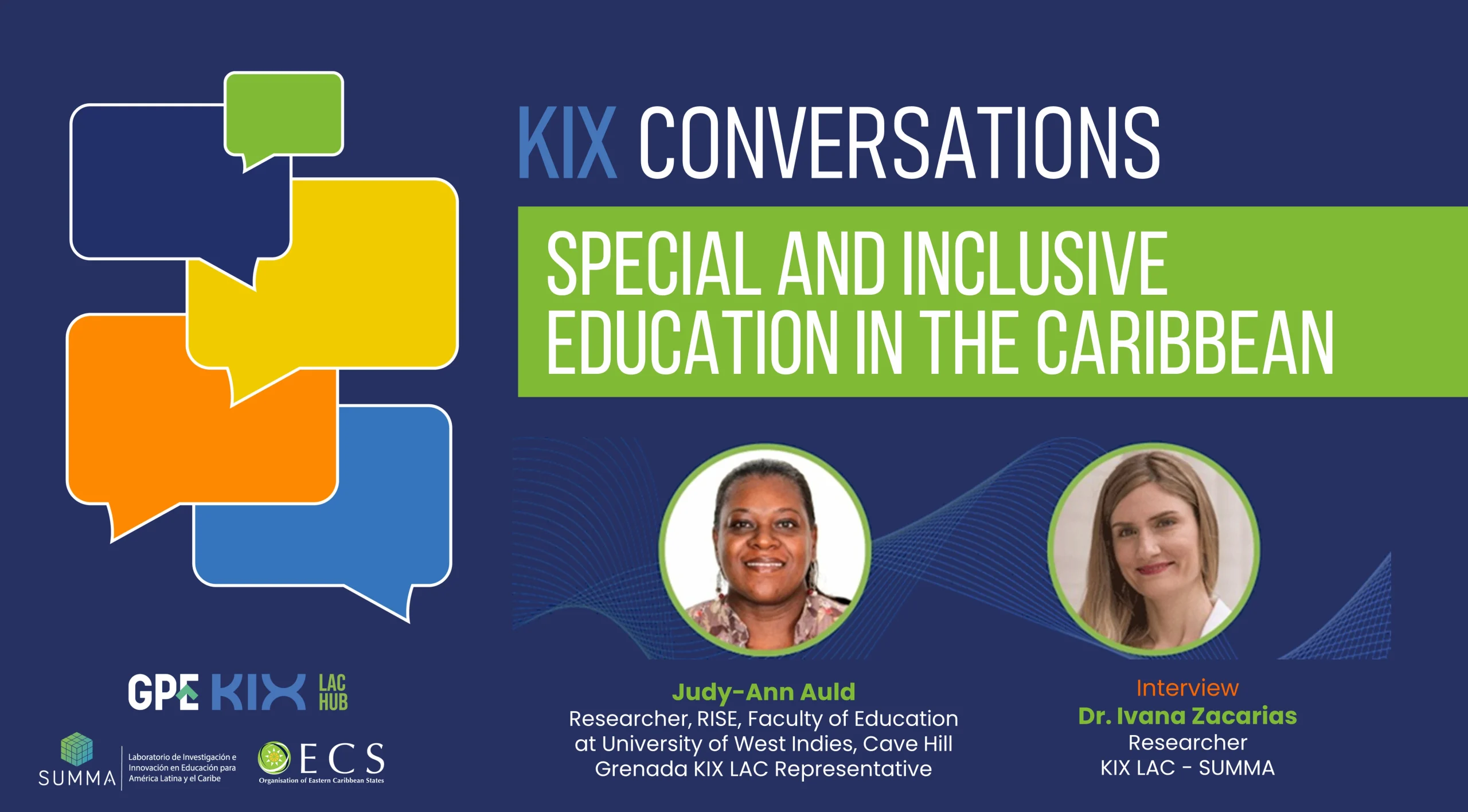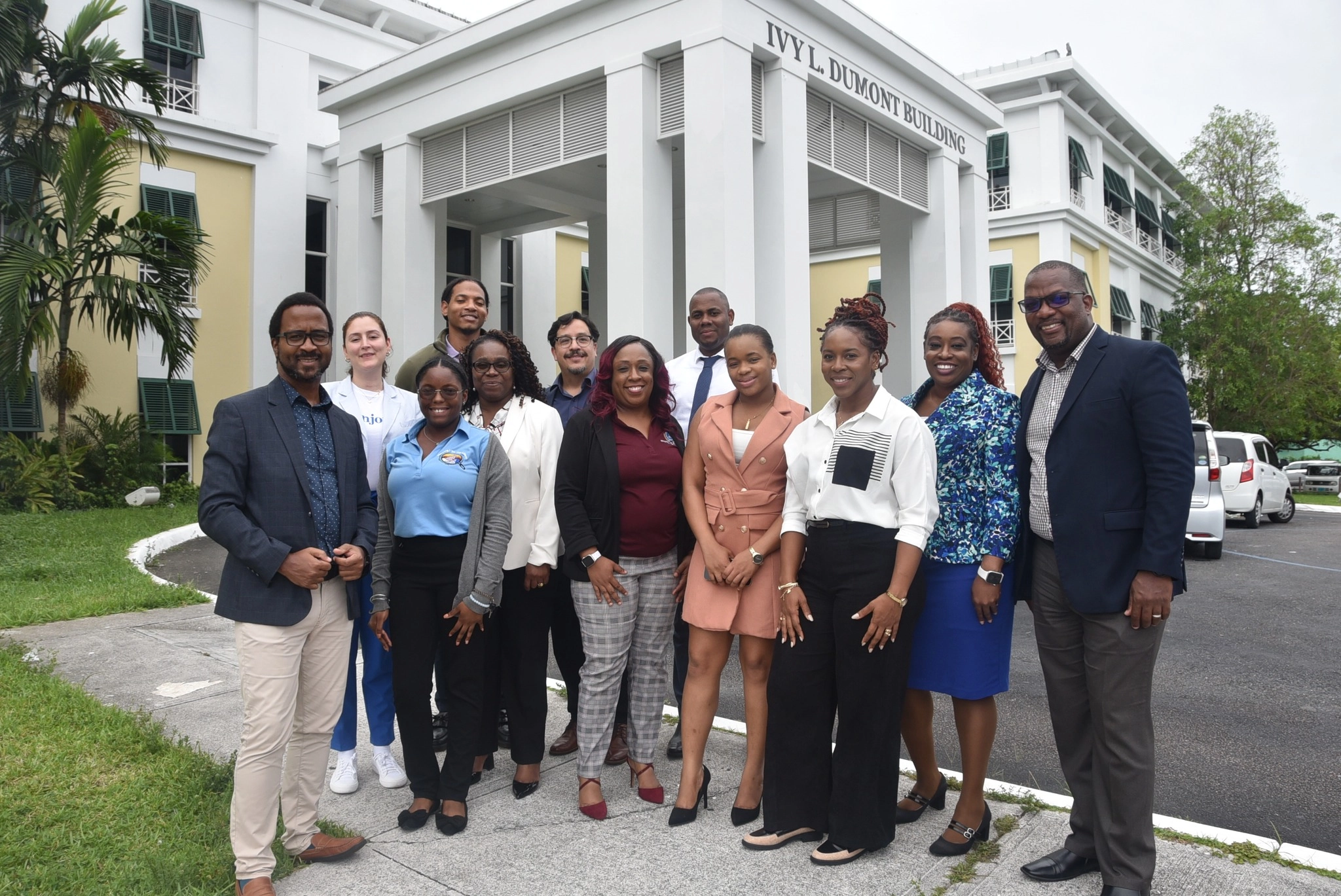The Importance of Evidence-Based Research on Early Childhood: Perspectives from the University of Guyana
14 de April de 2025

Share
Interview with Delicia Vancooten, Professor of Early Childhood Education, University of Guyana, conducted by Catalina Godoy, Research and Evaluation Assistant, KIX LAC – SUMMA.
❝The University of Guyana implements strategies to translate early childhood research into educational policy and practice through sustainable collaborations with local, regional, and international organizations..❞
Delicia Vancooten holds a Master’s degree in Early Childhood Development and currently serves as a lecturer at the University of Guyana, where she also contributes to the University’s Early Childhood Centre of Excellence. In this role, she guides students in research methodology and practice. With over fifteen years of experience in the early childhood sector—four of which have been dedicated to lecturing in the Faculty of Education and Humanities—her work reflects a strong commitment to the field. Her professional interests include early childhood leadership, curriculum design, and culturally responsive pedagogy.
As part of the Voices that Resonate interview series — which has featured reflections such as “It is possible to improve results in Latin America without stigmatizing anyone” and “The importance of data in the protection of our students’ educational trajectories” — and within the framework of the Knowledge Mobilization Cycle: Use of Evidence for Early Childhood Education and Care, we spoke with Ms. Vancooten to explore the role of the University of Guyana in generating and mobilizing evidence on early childhood education, to inform decision-making both within the university and public policy.
Our conversation explored the institution’s key role, the strategies implemented to translate knowledge into practical actions and educational policy, the main challenges faced in this process, and the next steps planned to further strengthen the use of evidence in Guyana’s pre-primary education subsector.
Efforts like this underscore the importance of producing research and evidence in the field of early childhood education. Research is essential for designing more effective, equitable, and sustainable policies and practices. Reliable, context-specific data enable informed decision-making that more accurately addresses the needs of young children during this crucial stage of their holistic development.
1️⃣ | In general terms, what is the university’s role in generating knowledge and evidence on early childhood education?
Guided by the principle that education is dynamic and ever-changing, the University of Guyana’s (UG) role rests on the helm of research. The university plays a crucial role in producing and promoting evidence-based knowledge, particularly through the Faculty of Education and Humanities and the university’s premier laboratory school, the University of Guyana Early Childhood Centre of Excellence (UG-ECCE).
UG-ECCE is a model learning institution, creating a conducive learning environment for educators and children. In addition, it serves as a research hub where child development, curriculum delivery, and inclusive practices are observed, documented, and refined to address the needs and interests of early childhood. When UG-ECCE was envisioned, leading research in Early Childhood Development was identified as the first component:
Through collaboration with faculties at UG and internationally, applied and basic studies will be done to establish and sustain a nationally and internationally recognised model for bridging research-to-policy gaps in Early Childhood Development. Hence, research findings will inform practitioners and policymakers about advancement and development trends.
Studies conducted at UG-ECCE have paved the way for culturally appropriate, theory-based, and evidence-driven practice. Research of this nature provides valuable insights that support academic inquiry and national educational development. These studies are pioneering how early childhood knowledge is generated. When summed up, one can recognize interlocking elements: the academic programmes offered by the University, the field-based learning, and collaborative research done at the UG-ECCE position the university as a key driver of innovations and an evidence producer that informs practices within early childhood education.
The essential idea is that decisions made by educators should be based on the best available evidence collected through rigorous research. Research conducted through various forms should be viewed as providing the strongest and most dependable evidence to guide practices within early childhood. The University’s role is a facilitator, supporting educators and budding researchers with an evidence-based approach to teaching and practice. This concept that the university enacts, encourages educators to understand where students are in their learning and guides educators on appropriate interventions and pedagogical practices. Therefore, improvements in student learning outcomes depend on the broader use of reliable evidence ingrained in classroom practices.
In doing so, the university recognizes its integral role as the “melting pot” for early childhood educators to share evidence from research studies and utilize the related evidence within their practical settings- for example, teachers from Region 3 share their findings and recommendations on an area of concern. Teachers from Regions 4, 5, and 6 incorporate these good practices and approaches suggested within their classrooms and evaluate their students’ outcomes-. Evidence of this kind is crucial in informing decisions about the effectiveness of an educator’s actions. Such evidence plays a vital role in monitoring students’ progress and evaluating the interventions’ impact.
2️⃣ | The university demonstrates a strong commitment to evidence generation. How is this commitment reflected in educational policy and practice, particularly in translating early childhood research into actionable strategies?
The University of Guyana implements strategies to translate early childhood research into educational policy and practice through sustainable collaborations with local, regional, and international organizations. It also fosters research-practice partnerships, engages with stakeholders, and promotes interdisciplinary collaboration and community practice.
One of the university’s primary strategies is integrating research in teacher preparation, engaging with courses such as Research Methods in Early Childhood Education, Psychology of Teaching and Learning, and Curriculum Development. Through these integrated courses, teachers are equipped with the “skillset” to analyze existing literature, apply evidence-based strategies, and conduct classroom-based inquiries. More so, going beyond, faculty members actively contribute to national educational reforms through curriculum reviews and policy consultations, and they serve as advisory board committees.
Collaborative research, grounded in issues such as inclusive pedagogy, early learning environments, and developmental assessments, among others, informs recommendations for the Ministry of Education and other educational entities. For instance, over the past three decades, the university has developed lasting partnerships with the Ministry of Education (MOE) through schools, educational districts, and other organizations, such as the National Centre for Educational Resource Development (NCERD), to prioritize research that directly addresses practical challenges and can be implemented in real-world settings. Shared collaborations in research inform numerous policies and guide practices that are mutually beneficial.
These valuable contributions support educators in our programmes with current, contextual, and relevant research. Research findings from UG-ECCE also inform university programmes and serve as a reference for broader educational policy discussions. To this extent, the university regularly hosts public seminars, practitioners’ workshops, and professional development sessions, all of which are grounded in early childhood and translate research into actionable tools for educators and policymakers.
In addition, the university collaborates with stakeholders who are recognized experts in their field or have a vested interest in research, working together to address shared challenges and ensure that the findings are relevant and actionable. Such engagements facilitate ongoing communication and information sharing between researchers and stakeholders, guiding policies and practices. More so, the university engages in participatory and interdisciplinary collaborations with regional organizations such as the Caribbean Development Bank (CDB) and the Caribbean Community (CARICOM) and international organizations like UNICEF and UNESCO to co-produce knowledge that informs policies and practices. These evidence-to-practice approaches that the university adopts reinforce its role as a key contributor to the national early childhood landscape.
3️⃣ | Although you mentioned it above, could you go deeper into how the university collaborates with other institutions, government agencies, or the private sector to strengthen the application of knowledge in early childhood?
Collaboration for UG is not transactional, but it is more relational. It is about cultivating trust, aligning vision, and working across sectors to ensure that knowledge does not remain confined to journals and books. Even though we write, conduct research, and publish findings, it is not just for us to have the knowledge piled up in print or in the media. Rather, it is “lived out” where it matters most- in the classrooms, in the homes, and in the policy decisions that will be made.
For instance, our partnership with stakeholders, such as the Ministry of Education, is long-standing, as we are the premier university serving the nation’s educators. Moreover, it is evolving, with our faculty members serving on curriculum review panels, sharing insights on national consultations, and offering technical insights grounded in research and current classroom realities. In addition, these spaces are not just for knowledge sharing but also for opportunities to listen, align, and co-create. UG has also deepened its commitment to other educational entities, supporting expanding possibilities within early childhood and special education. This is evident through UG’s collaboration with the Cyril Potter College of Education (CPCE) and the emerging partnership through ties with Georgetown International Academy (GIA). While GIA offers direct support to children with special education needs, the University has commenced contributing to areas of pedagogical training, research design, and contextual understandings that guide early childhood.
Moreover, UG-ECCE facilitates bi-weekly interactions and collaborations with local early childhood centres from various communities. Upon visits, these centres gain insights through observing developmentally appropriate practices in early childhood education that are inculcated within their centres. Hence, collaboration for us at the university is purposeful and intentional, rooted in the belief that knowledge reaches its fullest potential when it is shared, tested, and shaped collectively.
❝It is essential that we recognize not only the need to generate evidence but also to curate, communicate, and contextualize it.❞
4️⃣ | However, are there specific programs or initiatives within the university that promote the mobilization of early childhood evidence?
Yes, definitely yes, in addition to the Bachelor’s of Education in Early Childhood, where educators are engaged in their research that contributes to the mobilization of evidence, the university also offers a Master’s of Education in Early Childhood Development, which further strengthens research capacity in the areas of curriculum design, leadership, and early childhood research. The master’s programme facilitates a deeper academic inquiry where graduate educators research pressing current educational issues, such as parent engagement and transition across levels in early childhood education, and within their thesis includes recommendations that are shared with stakeholders and other relevant authorities. When this is done, it contributes to the local policy and dialogues.
Moreover, UG-ECCE promotes the mobilization of early childhood evidence by hosting seminars, demonstration lessons, and exposing educators to collaborative learning environments, all centered around addressing contemporary issues in education. Faculty members and educators often engage with UG-ECCE to adopt evidence-based approaches and collect data and findings. Beyond all the formal programmes the faculty offers, the university regularly participates in regional and international conferences, publishes peer-reviewed articles, and engages in partnerships and community-based work with other early childhood centres. These layered initiatives underscore the university’s commitment to making early childhood research usable and impactful by ensuring that what is learnt in theory is applied meaningfully in practice.
5️⃣ | Now, back to the central issue of evidence generation, how do they ensure that the evidence used is up to date and responds to current challenges in early childhood education?
The University of Guyana’s directive in staying current in early childhood education isn’t simply a matter of keeping pace with global trends. It is more about staying grounded in local realities while engaging critically with emerging knowledge that transcends globally. At UG, this balance is at the heart of the work that is carried out, where evidence is approached not as something static to be acquired but something that is “alive”. Alive in the sense that we do not just look at issues that would have transpired in the past and act solely on them. We actively engage in local research, often shaped by the very participants themselves – children, their families, educators, and the communities these educators serve.
The university draws on international research and incorporates applicable and transferable findings to our local settings. In addition, we draw from student inquiries and field-based learning across Guyana. It is in spaces like these, between theory and lived experiences, that our work evolves, faculty members remain actively engaged with scholarly research and regional discourses. They attend international conferences like the International Association of Laboratory Schools (IALS) and the World Forum Foundation and contribute to publications by renowned bodies in the Caribbean, UK, Canada and the USA, such as the American Journal of Play, Journal of Early Child Development and Care, SAGE, UWI Press, Macmillan, IntechOpen and Austin Macauley. Amongst our impacting pieces highlighting Guyanese ECD pedagogical practices and early learning are: Capturing Childhood Thoughts: This COVID Thing Is a Serious Thing; You Can’t Cough or Sneeze in Peace. The Status of Nature Play in Guyanese Early Childhood Settings. More Than Just Caregivers: Promoting Higher Education in Guyanese Early Childhood Workforce. Making Meaning of Parents’ Stories: Interpreting Quality at the University of Guyana Early Childhood Centre of Excellence. Languages of discipline in early childhood settings in Guyana.
Just as importantly, we listen; as a faculty, we listen; we listen to parents of the UG-ECCE, we listen to the children, we listen to the educators we engage with during their practicum reflections, and we listen to the communities that shape how early childhood looks and feels in Guyana. Subsequently, through their practicum and research, our educators are taught to ask those hard questions and follow wherever these probing questions lead, whether they are pursuing a bachelor’s or a master’s programme. Additionally, they are given opportunities to examine current transition practices in early childhood and reflect on children’s play habits in various classroom settings. The goal of doing this is always the same: to help us at UG respond thoughtfully and meaningfully to the needs seen in the classrooms. Thus, the evidence that is utilized is not just up-to-date, but it is in motion and growing with us by reflecting on the realities of the present, the questions of the moment, and the possibilities of what education can be when rooted in both knowledge, practice, and care.
6️⃣ | To make efforts such as these, there are always difficulties along the way. What are the main challenges facing the university in mobilizing evidence on early childhood education, and how do you address them?
Mobilizing evidence in early childhood education is not always straightforward, especially within the context of disseminating information, as continuity and time, among other factors, usually pose a challenge. One of the persistent challenges faced at the university is not in producing the actual knowledge but in disseminating it where it is most needed within classrooms in rural areas and where it can be effectively utilized. Numerous research studies are often produced, pointing to developmentally appropriate practices; however, they are not always appropriately utilized. We recognize that, at times, research outputs usually live in academic spaces and do not go beyond, in the sense that they remain behind academic doors or are found within thick reports on shelves. Thus, translating those insights into actionable causes is not an easy task, for instance, reshaping educators’ perspectives from a teacher-centered learning approach to student-centered learning. In addition, advancing the current play-based pedagogy poses challenges for some educators to adjust to. Thus, it is essential that we recognize not only the need to generate evidence but also to curate, communicate, and contextualize it. Another challenge is continuity, as research projects are often time-bound, while the issues we address – learning disparities, inclusive education, and transition – are ongoing. Thus, bridging that temporal gap between research cycles and the rhythm of real-world classroom means that we need to think long-term, even when utilizing some short-term tools and periods allotted to us.
In the face of these challenges, we are not passive; we have begun to shift from a teacher-directed, chalk-and-talk dissemination strategy to teacher-friendly formats, where teachers serve as facilitators and are provided with reflective tools. Reengaging educators in workshops that center stories and examples of actual outcomes rather than just statistics. We hope to have these sessions with educators, and the activities engaged in will be based on current research. These can be conducted at UG-ECCE, where reflection-based sessions are held for professionals in education. In essence, educators are not just consumers of the evidence that they receive but will become contributors to a growing practice informed by the body of knowledge.
Moreover, the research-based evidence will be applied practically, incorporating not only emerging trends but also considering our local realities when researching to address the challenges we currently face in implementing it. Notable challenges, such as financial, infrastructural, and procedural, are some that we are currently addressing.
We are also building deeper partnerships, as mentioned with GIA, MOE, NCERD, and CPCE, which will allow us to extend the relevance of our research work through collaborative implementations.
❝Our next steps are driven by one unshakeable belief that evidence is only powerful when it is used.❞
7️⃣ | Finally, could you share what next steps or initiatives the university plans to further promote the use of evidence in early childhood education within Guyana’s education system?
Generally, at the university, we believe that evidence does not end with research, but rather begins with it. So, the next chapter in our journey is about expanding the systems and spaces that allow evidence to “live” beyond the classroom, beyond the reports, and into the hearts of educators, showing us how we can teach, learn, and lead. One of our key priorities is the evolution and expansion of the UG-ECCE into regional centres for research and innovation in our country and the Caribbean. This does not end with rebranding the space but with redefining its role. Foreseeing UG-ECCE as a national hub for research and innovation, we envision a centre that not only models good practices but also carries them out through longitudinal studies that will be continued. In addition, piloting innovations, especially with a STEAM approach for early childhood and data-informed coaching for educators nationwide.
At UG, we recognised that the future of evidence-based practice relies on access. Reviewing the number of persons who can access these programmes at a given time is limited. Hence, we are exploring the development of a digital research repository that provides a public platform accessible to educators, where they can share research conducted by other peers and faculty members. Access to the current body of knowledge and practice will not only be shared with policymakers but also with teachers, caregivers, and community leaders who have an interest in early childhood. This initiative started as a blog that UG-ECCE developed, where mini-researches are shared for the public to utilize and make meaningful use of.
The goal is simple: to democratize knowledge so that anyone committed to the well-being of young children can utilize it. Another major initiative involves mentorship in research and cross-faculty collaboration in research that we intend to continue and expand further across other universities. Linking undergrad and grad students with faculty mentors and other experts within various fields can contribute to the edification of early childhood. Moreover, not limiting resources and networking, but rather transcending them into other areas, such as agriculture, science, and technology, which have contributing factors that help promote and develop early childhood education. Ultimately, our next steps are driven by one unshakeable belief that evidence is only powerful when it is used.

Catalina Godoy’s closing remarks: Our conversation with Ms. Delicia Vancooten has highlighted the University of Guyana’s meaningful efforts to link research with practice in early childhood education. Through initiatives like the UG-ECCE and strong partnerships, the university is helping ensure that evidence truly informs classroom practices and public policy.
We invite other universities to reflect on their role in generating and mobilizing evidence on early childhood education, and to share their experiences to continue strengthening the link between knowledge and public policy. If you are interested in writing a blog with us or participating in the “Knowledge Mobilization Cycle: Use of Evidence for the Early Childhood Education and Care”, feel free to contact Mar Botero (Knowledge Mobilization and Community Engagement Coordinator, KIX LAC) at mar.botero@summaedu.org
Finally, we would like to extend our special thanks to Magali Pérez Ryzio, Communications Manager, and Mar Botero from KIX LAC for their valuable contributions to this interview.























































































































